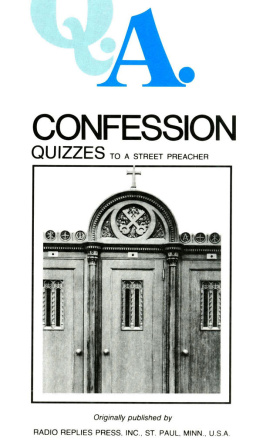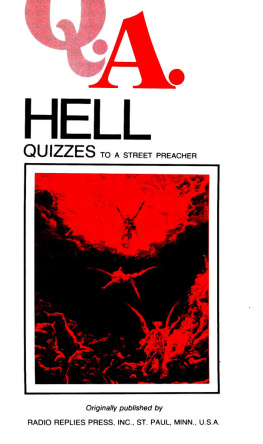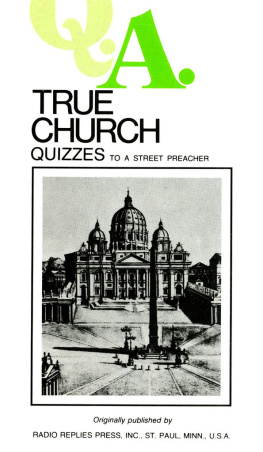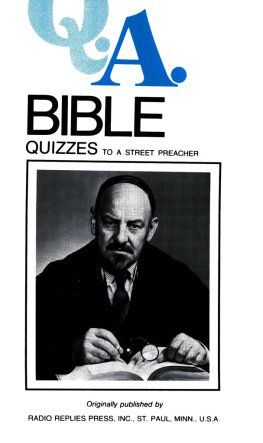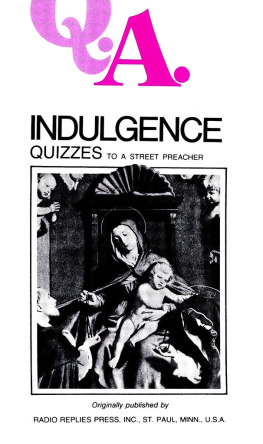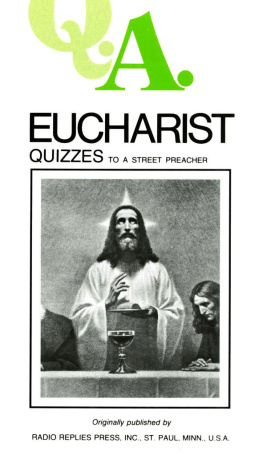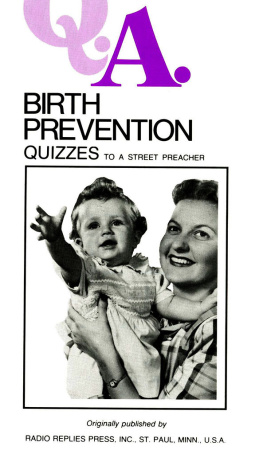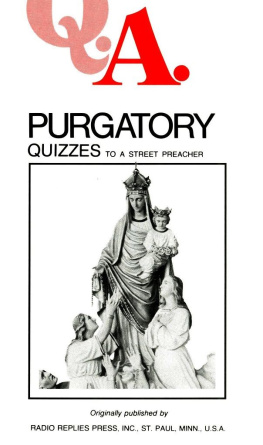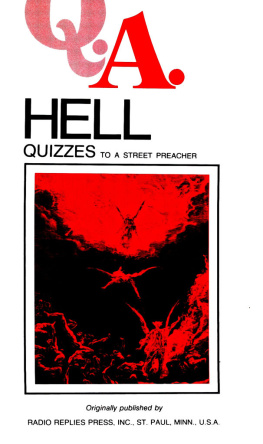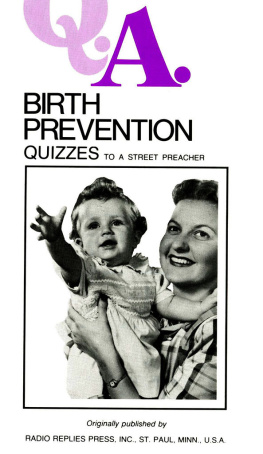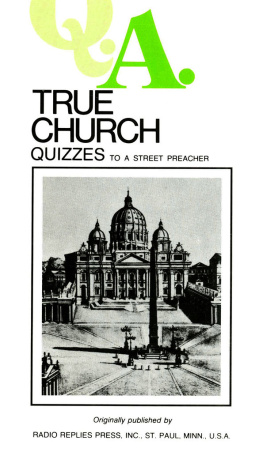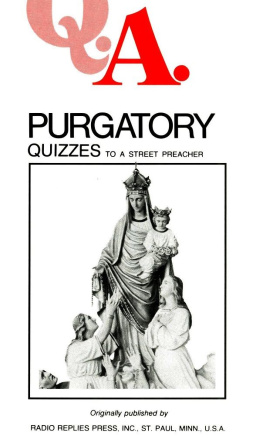Fr. Chas. M. Carty - Confession Quizzes: Quizzes to a Street Preacher
Here you can read online Fr. Chas. M. Carty - Confession Quizzes: Quizzes to a Street Preacher full text of the book (entire story) in english for free. Download pdf and epub, get meaning, cover and reviews about this ebook. year: 2015, publisher: TAN Books, genre: Religion. Description of the work, (preface) as well as reviews are available. Best literature library LitArk.com created for fans of good reading and offers a wide selection of genres:
Romance novel
Science fiction
Adventure
Detective
Science
History
Home and family
Prose
Art
Politics
Computer
Non-fiction
Religion
Business
Children
Humor
Choose a favorite category and find really read worthwhile books. Enjoy immersion in the world of imagination, feel the emotions of the characters or learn something new for yourself, make an fascinating discovery.
- Book:Confession Quizzes: Quizzes to a Street Preacher
- Author:
- Publisher:TAN Books
- Genre:
- Year:2015
- Rating:4 / 5
- Favourites:Add to favourites
- Your mark:
- 80
- 1
- 2
- 3
- 4
- 5
Confession Quizzes: Quizzes to a Street Preacher: summary, description and annotation
We offer to read an annotation, description, summary or preface (depends on what the author of the book "Confession Quizzes: Quizzes to a Street Preacher" wrote himself). If you haven't found the necessary information about the book — write in the comments, we will try to find it.
Fr. Chas. M. Carty: author's other books
Who wrote Confession Quizzes: Quizzes to a Street Preacher? Find out the surname, the name of the author of the book and a list of all author's works by series.
Confession Quizzes: Quizzes to a Street Preacher — read online for free the complete book (whole text) full work
Below is the text of the book, divided by pages. System saving the place of the last page read, allows you to conveniently read the book "Confession Quizzes: Quizzes to a Street Preacher" online for free, without having to search again every time where you left off. Put a bookmark, and you can go to the page where you finished reading at any time.
Font size:
Interval:
Bookmark:
Confession Quizzes
to a Street Preacher
Fr. Chas. M. Carty
&
Rev. Dr. L. Rumble, M.S.C.
Archiepiscopus Sancti Pauli.
Written by
Fr. Chas. M. Carty
&
Rev. Dr. L. Rumble, M.S.C.
Copyright 1976 by TAN Books
Originally published by
Fathers Rumble and Carty
Radio Replies Press, Inc.
St. Paul, Minn., U.S.A.
Complete and Unabridged
TAN Books
Charlotte, North Carolina
www.TANBooks.com
1976
CONTENTS
CONFESSION QUIZZES TO A STREET PREACHER
1. What is Confession?
Confession is the telling of sins in the Sacrament of Penance instituted by Jesus Christ by which those who fall into sin after Baptism may be restored to God's grace. The Sacrament of Penance supposes that the recipient is truly repentant of his sins. It involves the admission of one's sins made to a duly approved priest in order to obtain absolution.
2. We Protestants believe that God alone can forgive sin.
And that is the Catholic teaching also. But the question concerns the way in which God has chosen to administer that forgiveness. We Catholics add that God can delegate His power if He wishes, just as the supreme authority in the state can delegate a judge to administer justice. Would you deny to God that power?
3. Forgiveness through the mediation of a priest is opposed to the doctrine that Christ is the only mediator.
One Mediator redeemed us. The priest does not redeem us; he is but an accredited agent of the one Mediator. The Sacrament of Penance is but one way of applying the mediation of Christ to men even as Baptism is another. And if Baptism is a Sacrament for the destruction of sin which we ourselves did not commit but which we inherit from Adam, another Sacrament is most fitting for the destruction of sins which we do personally commit after our Baptism. Christ certainly thought so, and instituted the Sacrament of Penance. If you believe in one Mediator, so do we; but we listen to that One Mediator and do as He has commanded us.
4. Can you prove that God did delegate that power to men?
Yes. Christ was God, and in St. Jn. XX., 21-23, we read these remarkable words: "Peace be to you. As the Father has sent Me I also send you. When He had said this He breathed on them; and He said to them: Receive ye the Holy Ghost; whose sins you shall forgive, they are forgiven them; and whose sins you shall retain, they are retained." Now Christ's mission was to destroy sin, and He gave that same mission to His Apostles. Knowing that their merely human power as men was quite insufficient, He gave them a special communication of the Holy Spirit for this special work. To say that Christ did not confer a true power to forgive sin is to rob the whole ceremony and the words of Christ of any real meaning. And it was obviously a power to be exercised. Christians applying to the Apostles for forgiveness.
5. How do you interpret the words of Christ as they are contained in the Gospel of St. John, 20:21?
His meaning is that what He has done they were commissioned to do likewise. The Hebrew salutation, "Peace be to you," means, "I forgive you Myself your failings, your denial of Me, your cowardice in my arrest, the vacillating of your faith, your negligence of My Mother, all is forgiven. 'Peace be to you.' My new commission to you all here is this: 'As My Father hath sent Me, even so send I you. What I have done for sinners, you are commanded to do likewise. The commission of My Father to Me is My commission to you and to your successors'." But for what purpose did His Father send Him? His Father sent Him garbed in His human nature with power to move mountains, with power to teach infallibly, with power to pour out grace, with power to work the supernatural, with power to offer up the Sacrifice spoken of by the prophet Malachias, with power to loose and to bind, forgive and to retain. "As My Father hath sent Me, even so send I you." The power exercised by Christ will also be theirs, namely, to teach unerringly, to interpret, to offer sacrifice, to forgive sin, and, therefore, for that duty and office now, "Receive ye the Holy Ghost." And to remove any doubt as to what He means He adds a solemn action which they never saw Him do before; He breathed His Own Breaththe Breath, the Spirit of the Risen God upon them, "Receive ye the Holy Spiritthe Holy Ghost."
6. What is the benefit of this breathing and receiving the Holy Ghost?
The purpose and benefit of endowing them with the Holy Ghost is to enable them to act in the power, in the place, and in the name of Jesus Christ, "Whose sins YOU shall forgive, they are forgiven them." Why should there be so many millions of Christians who put aside the plain meaning of these words?
7. What is the difference of that breathing and conferring the Holy Ghost and the coming down of the Holy Ghost on Pentecost Sunday?
On Easter night instituting the Sacrament of Penance our Lord did not give what He had already given in Baptism and what was to be given on Pentecost. That which He gave on the night of His Resurrection was not the gift of holiness, or anything for the Apostles' benefit, but a gift for all mankind and for all times; "Whose sins you shall forgive, they are forgiven them." The coming of the Holy Ghost upon the Apostles on Pentecost brought the perfection of the divine life of grace to each disciple and the special helps for their Apostolic mission. His Father sent Christ on a twofold mission: to glorify the Father and to redeem man. The worship of His Father He provides for before He dies by the continual showing forth of His death in the Holy Mass, and the forgiveness of man He provides for on the day of His rising.
8. Christ had the power but the Apostles didn't.
Many Protestant ministers admit that Christ conferred this power on the Apostles Easter Sunday night when He said, according to your Protestant Bible. St. John 20-21. "Then said Jesus to them again Peace be unto you; as My Father hath sent Me, even so send I you. And when He had said this He breathed on them, and saith unto them, 'Receive ye the Holy Ghost; whosoever sins ye remit, they are remitted unto them; and whosoever sins ye retain, they are retained'." Why tolerate such words in your Protestant Bible if you do not make these words mean exactly what they say. Must we consider as nonsense the words, "Amen I say to you, whatsoever you shall bind upon earth, shall be bound also in heaven; and whatsoever you shall loose upon earth, shall be loosed also in heaven." Mt. 18:18. "As My Father hath sent Me so do I send you," means in plain languageAs I came into the world to reconcile sinners to their God, so likewise are you called upon to go out and become the ministers of reconciliation.
9. Do not the words of Christ, "Whose sins you shall forgive, etc." mean announcing and preaching that sins were forgiven?
No. The Protestant historian, Sparrow, in his "Rationale" says: "I could name more Fathers, as St. Augustine, St. Cyprian and others, but I spare. These I have named are enough to give testimony of the former generation; men too pious to be thought to speak blasphemy, and too ancient to be accused of Popery. But to put all out of doubt, let's search the Scriptures; look into the twentieth of St. John, ver. 23: 'Whosoever sins ye remit, they are remitted unto them; and whosoever sins ye retain, they are retained.' Here is plainly a power of remitting sins granted to the priest by our Blessed Savior. Nor can it be understood as remitting SINS BY PREACHING, as some expound it, nor by baptizing as others guess, for both these, preach and baptize, they could do long before; but this power of remitting they received not till now, that is, after His Resurrection. That they could preach and baptize before is plain." This Protestant historian, therefore, clearly shows that the Apostles received a new commission, a new power which they did not possess until Easter Sunday night. They already had the power to preach but the power to absolve they received only when Christ came back to them from the tomb on Easter Sunday night.
Next pageFont size:
Interval:
Bookmark:
Similar books «Confession Quizzes: Quizzes to a Street Preacher»
Look at similar books to Confession Quizzes: Quizzes to a Street Preacher. We have selected literature similar in name and meaning in the hope of providing readers with more options to find new, interesting, not yet read works.
Discussion, reviews of the book Confession Quizzes: Quizzes to a Street Preacher and just readers' own opinions. Leave your comments, write what you think about the work, its meaning or the main characters. Specify what exactly you liked and what you didn't like, and why you think so.

